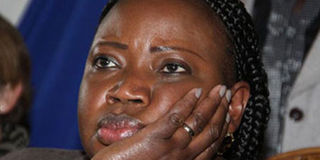ICC and rights groups should apologise for falsely raising our hopes for justice

International Criminal Court (ICC) Prosecutor Fatou Bensouda. Ms Bensouda, the International Criminal Court, and its intermediaries in Kenya need to engage in some honest reflection. FILE PHOTO
What you need to know:
- His strategy was obvious. Knowing that the evidence was weak or lacking in cogency, he chose to prosecute his case in the court of public opinion.
- The Office of the Prosecutor had a moral and statutory obligation to investigate these cases while the court had oversight responsibility in respect of the prosecutor.
- The organisations involved in the entire witness mismanagement programme should be subjected to forensic audit.
Ms Fatou Bensouda, the International Criminal Court, and its intermediaries in Kenya need to engage in some honest reflection.
Why did their cases against Francis Muthaura, Henry Kosgey, Hussein Ali, and Uhuru Kenyatta collapse so spectacularly? We must find the answers to this question because the ICC must never again be allowed to lead any country down the garden path of false hope and unreasonable expectations.
Those with long experience in criminal trials were suspicious of Luis Moreno- Ocampo’s posturing from the very first day he appeared on Kenyan media.
His strategy was obvious. Knowing that the evidence was weak or lacking in cogency, he chose to prosecute his case in the court of public opinion. Within no time, his name was inscribed on our matatus — a clear statement of our feverish expectations.
RIDDLED WITH INEPTITUDE
The one lesson we have all learnt from these cases is the folly of giving excessive media attention to criminal complaints in the early stages of investigation.
Indeed, the media should have scrutinised Mr Moreno-Ocampo for it was evident that the grandstanding of some columnists was a large part of his strategy.
The Office of the Prosecutor had a moral and statutory obligation to investigate these cases while the court had oversight responsibility in respect of the prosecutor.
Both of them failed to carry out these duties. How will they account to the member states for the time and resources that were squandered in an exercise that was riddled with ineptitude?
Perhaps it is time the ICC reviewed its system of gathering evidence. In the case of Kenya, it hired intermediaries largely comprising local human rights groups.
Was this done through competitive bidding? What unique competencies did these groups have, if any? Was there any evaluation of their capacity to undertake investigation, collate evidence, and ensure the probative value of whatever data they collected?
WITNESS MISMANAGEMENT
How did we end up with groups with no knowledge of life outside the city boundaries purporting to conduct investigations in the Rift Valley?
As early as January 2, 2008, these groups displayed a curious reluctance to listen to those from the region; they refused to believe that what was going on there had gone out of hand.
Indeed, some of them even travelled abroad, where they proclaimed that “no particular ethnic community was being targeted in the violence” and that there were no crimes against humanity.
At what point did they change their mind and why? Did their change of heart have anything to do with the immense resources that were suddenly made available to pursue political actors?
There has been a catalogue of allegations in these cases and as a nation, we are now engulfed in a scandal. It is time all these claims about reports being doctored, evidence being expunged, witnesses being sought, bought, coached, in hiding, or “disappeared” were interrogated.
The organisations involved in the entire witness mismanagement programme should be subjected to forensic audit.
Considering that the ICC is funded by member states, the intermediaries that it hired are, vicariously, accountable to the member states. When are they going to open their accounts for public scrutiny?
HOPES RAISED, EMOTIONS WASTED
As Kenyans, we have a right to know how money we contribute to an international body is ultimately spent.
But even before all this, the groups that undertook the investigations on behalf of the ICC must apologise to Kenyans. They raised our hopes and wasted our emotions.
Worst of all, these preachers of accountability and integrity squandered a remarkable opportunity to deliver justice to the victims.
There has been no admission of failure from Ms Bensouda and local activists, only blame games and stunts, playing the injured party.
The very media that Mr Moreno- Ocampo courted so furiously have now become the object of her wrath. How ironic!
Like the intermediaries, Mr Moreno-Ocampo and Ms Bensouda owe the victims an unreserved apology. How can they be made liable for their gross negligence?
Memories fade and witnesses move on. The chances that these cases will ever be revived — as our activists are now claiming in the media — grow slimmer by the day. What a travesty!





